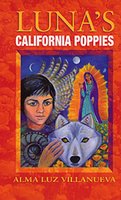
I just finished reading Luna’s California Poppies by Alma Luz Villanueva. I first got this book about a year or two ago. Had in on the shelf of “to be read” books. I had just started it and was about twenty pages along. L* reached a point where she was hungry for novels. Since she’d already finished everything by Graciela Limón, I offered her Luna. (This was before our return to Califas). L* loved it. Went on to tell me how great it was, and I then started resisting reading it. (like a pendeja. I do that some times, just resist reading books.) This one is complicated by the fact that I’ve read Alma Luz Villanueva’s La LLorona and Other Stories, which features some of the same characters. So, critically, I’ve worked through a particular reading of the characters, and I knew that this book might/would challenge that reading.
L* taught this book in her Ethnic Writers class last fall, and all the students really connected with it.
Anyway, I’ve finally been reading it in the tub these last couple of weeks and can’t praise it ENOUGH! First, If you’re at all interested in Chicana feminist constructions of the Divine, then this is the book for you! It’s structured as a diary, from young Luna, growing up on the poor side of San Francisco (1956-57), written to La Virgen de Guadalupe. The first entry:
Dear La Virgen,
Can you keep a secret or two like everything I write to you cause there’s no one else to write to or talk to but you. About how I feel I mean. How i really feel and all the weird stuff that happens in my life. Like don’t tell God or any thing cause its none of his bees wax, OK? I figure if I don’t pray to him he’ll kinda leave me alone and not punish me for the stupid things I have to do some times like steal stuff to eat like the phoney ham with El Diablo on it...
The epigraph to the book is from Gayl Jones’s Mosquito--in fact, now I think of it, it may be have been this epigraph that led me to Mosquito to begin with. Unless it was when I was researching the song “Delgadina.”
Epigraph:
Mexicans, they’s supposed to be the cosmic race...And then I started thinking it must be nice to be a people that looks at each other and sees they own gods and ain’t have to look at other people’s gods.
Next this is a great book about writing, because Luna’s writing this journal just for herself and La Virgen, right? ‘cause she has no one else to talk to. But then, as she shares it with someone, she’s given the assignment to learn four vocabulary words each week, and then at the end of the week she writes them into a poem. And she’s got that magical childhood voice--in spite of the crap she’s been through--and I just found it really inspiring and it made me want to keep a journal and write poems.
Finally, it’s a fierce novel about resistance, because Luna finds a way, you know? Like rather than just feeling alienated from God The Father who Smites his enemies, she develops an image of La Virgen which is akin to her dead grandmother, Mamacita. Rather than accepting the stupid things a racist white teacher says to her, (“It’s against the law to pick California poppies because they’re the state flower”) she resists by eating the flowers so she can bring all their sunshine inside of herself.
I think this is a young adult novel, not because it’s written for young adults, but because it helps us reconnect to the young adult we once were.

1 comentario:
Ktrion, this book sounds amazing. I'm looking for my next good read! Ooohh, and for numerous reasons, but also b/c I told her you like her books, mi madre is totally into Octavia Butler :-)
Publicar un comentario